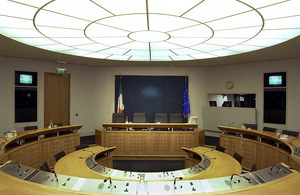From top: Committee Room, Leinster House: Derek Mooney
Everyone’s talking about New Politics.
But no one will say what it means.
Until NOW!
Derek Mooney writes:
What exactly is this “New Politics” we have been reading and hearing about so much lately?
It was the question that should have occurred to me as soon as the Public Relations Institute asked me to participate in a panel discussion they held last Thursday as part of a half day seminar entitled: Public Affairs in the era of ‘New Politics’.
But it didn’t. Like many others, I have been throwing about the phrase “new politics” in the two and a half weeks since the Dáil elected a Taoiseach as if everyone understands what it means.
But do we? Do the people who are supposedly responsible for our ‘new ‘politics even understand what the phrase means or what the concept is meant to encompass, apart from differentiating it from the “old politics”?
Do we know in what way it is supposed to be different or why?
Unfortunately for me, this simple basic question only popped into my head while sitting on the dais last Thursday rather than during the days of preparation beforehand.
But with each challenge comes an opportunity. Just as the question came in to my head the discussion opened out to the floor and with it came a rare moment of lucidity, dare I say: an epiphany.
Just then I heard a familiar voice re-enter the discussion to offer a definition “new politics”. It was a very familiar voice: it was mine.
The definition I came up with is quite simple: ‘new politics should be about policy not personality’.
Don’t get me wrong, I am no Pollyanna. I do not think that politics has changed overnight and that we have reached now some utopian perfection where every TD and Senator has suddenly become high-minded and abandoned all thoughts of party loyalty and personal advancement in favour of the common good
I also grasp that my definition might sound a little glib or overly simplistic but bear with me and I will try and explain why I think the definition I offer is valid.
One of the greatest failing of our supposed “old politics” was that most political crises of the past were not resolved by any great changes of policy or direction but by the drama of a political head on a platter.
Someone, usually not one of the main protagonists, was designated as the fall guy, they paid the price and the system continued along without change or reform, once the crowd’s lust for some blood on the carpet was sated.
By making a few boring, even tedious, changes to how Dáil committees operate and allowing them to actually oversee public policy and by making parliamentary questions work, we may just have moved the focus back on to the more complex issues of policy rather than the more simplistic and entertaining issue of personality.
One of the many reasons why the global economic crisis hit Ireland worse than other places is because public policy and economic dogma here had gone for too long unchallenged. The regulators went unregulated, civil society and the party system failed to advance realistic alternatives.
One of the most curious, and perhaps most re-assuring aspects to this gradual move to new politics is the fact that it has not come about by design. It is not the brain child of some think-tank or research group, rather it is the response of practising politicians working together to find a way of dealing with the result of the results of the last general election.
To their credit, the reform committee chaired by Ceann Comhairle, Sean Ó Fearghaill, comprising TDs from across the political spectrum worked quietly and quite speedily to devise an agreed reform package which though hardly exciting or thrilling may just be about to make day-to-day politics more responsive and more about policy.
The reforms agreed by committee from the establishment of a budgetary oversight committee to allowing the Ceann Comhairle to decide on the relevance of ministerial replies to parliamentary questions and the establishment of a league table of ministers who fail to properly answer questions move us closer to the levels of accountability and answerability we should have had long back.
No doubt we will continue to see “old politics” re-emerge from time to time, indeed it is hard to see Enda Kenny’s appointment of his expanded cohort of Minsters of State as an exercise is anything other than the old politics of personality – the personality in question being his and its maintenance in office for as long as it possible.
We see it too in the handling of the O’Higgins Report and the embroiling of the Garda Commissioner in the controversy.
We can hope however, as the Dáil and its committees begin to exert their new powers and their responsibilities, to see less of the old politics, but not so much less that politics losses its touch of theatricality, drama and odd moments of farce.
Not all aspects of the old politics should be abandoned.
Derek Mooney is a communications and public affairs consultant. He previously served as a Ministerial Adviser to the Fianna Fáil led government 2004 – 2010. Follow Derek on Twitter: @dsmooney





“but not so much less that politics losses its touch of theatricality, drama and odd moments of farce.”
Think its safe to say we will have theatrics, drama and farce by the bucket load.
Derek, I have to ask, why have you been throwing around the phrase “New Politics” for the last two and a half weeks or so, if you have no clue what it means (in common with the rest of us).? This strikes me as symptomatic of “Shite politics”, not “New Politics”. So far as I can gather – New Politics is a meaningless catch phrase designed to appeal to………..whatever you’re having yourself. It is about as real as ‘Noo Labour’ in the UK which, quaintly, signalled the abandonment of any principles that the Labour party had had before that. Is that what you’re talking about?
Santa’s naughty list? Thanks lads, I had mistakenly thought this was a site for adults.
More fool you
this subservience of fg to their fianna fail masters, all to ensure enda can call himself taoiseach for another day will tear fg apart, which cannot be a bad thing
Amen to that, Dav. From your mouth to God’s ear.
Why do you’s always have pictures of the people who write these things?
“New politics” are simply politics as they should be in civilized society. I believe these are taught to 19-20 yearolds in colleges all over the country. No revelation.
One does not need to be a ministerial adviser to the biggest party for many years to write such bland and uninformative piece. Disappointing.
Sheik Yahbouti conveyed it much better. Thank you sir.
New politics for Ireland is, after 100 years of this state, the political system has finally entered, the 20th century.
Hip, hip, hooray, 3 cheers.
Maybe in the next 50, years it may progress to the 21st century.
Politics for slow very slow learners.
“New Politics” is a FF consultant schooling BS commentariat in the art of “New Politics” .#Noveau # Gauche.
It’s year zero as far as far as Fianna Fáil politics and policies are concerned. The reeducation of short indifferent memories starts here.
So the epiphany is that politicians should do a professional job? Bhudda wept. Do we sweep all the idiots into the political system in this country before they do a day’s actual work or something?
“I think we should do a job like professionals. My god! What an epiphany! I must write this up as though it was an inspirational personal revelation instead of what the rest of the world considers to be baseline adult human behaviour by non-asshats!”
” but not so much less that politics losses its touch of theatricality, drama and odd moments of farce.
Not all aspects of the old politics should be abandoned.”
So…
– Driving cars down steps
– Pulling women into laps
that kind of thing should be kept?
There will be no “new politics” until the people stop electing (mostly) men who are simply interested in power. Take for example Alan Kelly; he wants to be leader of the Labour Party so he personally can be in power. Now he might do good or bad with it, depending on your point of view, and he himself will do almost anything to achieve and maintain it. Argue for water charges or against them, whatever advances his position.
And the vast majority of politicians, of all shades, are just like him.
So new politics is doomed, because the people vote for the likes of Kelly, and there isn’t the slightest sign that they will change.